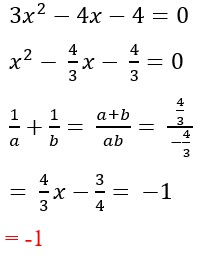a(b + c) = ab + ac
Example 1
= 2x(3x + 4) - 3(3x + 4)
= 6x2 + 8x - 9x -12
= 6x2 - x - 12
a(b + c) = ab + ac
Example 1
= 2x(3x + 4) - 3(3x + 4)
= 6x2 + 8x - 9x -12
= 6x2 - x - 12
1. (a + b)(a + b)
2. (a - b)(a - b)
3. (a + b)(a - b)
= a(a - b) + b(a - b)
= a2 - ab + ba - b2
= a2 - b2
This is referred to as the difference of two squares.
From difference of two squares:
(a + b)(a - b) = a2 - b2
= (3x)2 - 42
= 9x2 - 16
While a(b + c) = ab + ac is expansion
ab + ac = ab + ac is factorization
3x is common hence:
= 3x(x - 3)
Use the rule: ax2 + bx + c
p x q = c and p + q = b
p x q = 12 and p + q = 7
The numbers are 4 and 3 since 4 x 3 = 12 and 4 + 3 = 7
x2 + 3x + 4x + 12
= x(x + 3) + 4(x + 3)
= (x + 4)(x + 3)
2x2 + 7x + 6 = 0
2x2 + 3x + 4x + 6 = 0
x(2x+3) + 2(2x + 3) = 0
(2x + 3)(x + 2) = 0
First Part:
2x + 3 = 0
2x = -3
x = -3/2
Second Part:
x + 2 = 0
x = -2
Hence x = -2 and x = -3/2



x = ½ or x = 2/3
2x = 1 or 3x = 2
2x - 1 = 0 or 3x - 2 = 0
(2x - 1)(3x - 2) = 0
2x(3x - 2) - 1(3x - 2) = 0
6x2 - 4x - 3x + 2 = 0
6x2 - 7x + 2 = 0